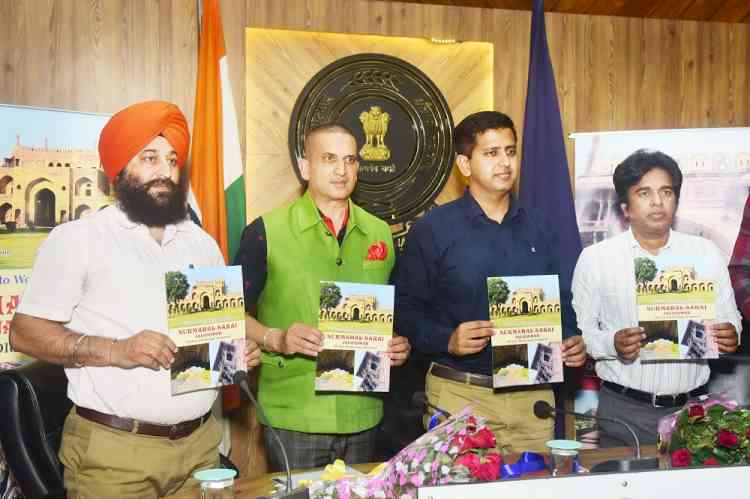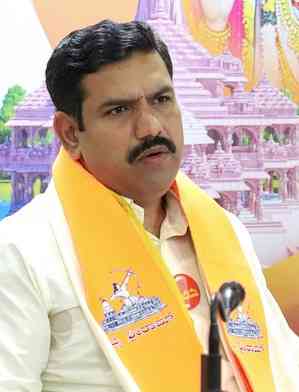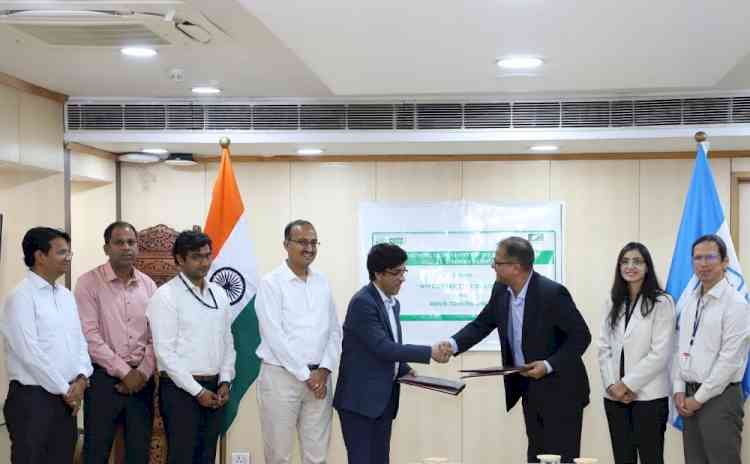Integrating innovations in IT with operational management in hospitals integral to its smooth functioning: Dr Chattopadhyaya
Author(s): City Air News(L-R) Dr. Biranchi Jena, Dr. Sunitha Maheshwari, Dr. G Giridhar, Dr. Usha Manjunath. Bangalore, December 21, 2015: ‘Adwitya 2015’ the two-day national healthcare conference conducted by Institute of Healthcare Management...


(L-R) Dr. Biranchi Jena, Dr. Sunitha Maheshwari, Dr. G Giridhar, Dr. Usha Manjunath.
Bangalore, December 21, 2015: ‘Adwitya 2015’ the two-day national healthcare conference conducted by Institute of Healthcare Management and Research (IIHMR), commenced with their second session today. The conference was attended by more than 200 healthcare professionals and students from different organisations and institutions.
Day two of the conference on healthcare brought together a cast of wonderfully passionate speakers to deliberate on the trends in healthcare operations. The speakers invited were Dr. Chandil Kumar, Dr. Selwyn Colaco, Mr. Subramaniyan M, Dr. R Shibaji Chattopadhyaya, Dr. H S N Rao and Dr. Prashanth Deshmukh. The focus from the outset was on trends in healthcare operations and how integration of technology in medical processes would help hospitals function smoothly as information would be relayed glitch free.
In the third plenary session the speakers Dr. Chandil Kumar (COO, Aster CMI Hospital, Bangalore), Dr. Selwyn Colaco (COO, Cytecare Hospitals), Mr. M Subramaniyan (Senior Manager IT, Sri Sathya Sai Institute of Higher Medical Sciences), Dr. R. Shibaji Chattopadhyaya (COO, Global Hospitals) and Dr. Usha Manjunath (Dean – Academic and student affairs, IIHMR Bangalore) were connected by the common theme ‘Trends in Health Care Operations’.
Talking about operational efficiency with IT, Dr. Chandil Kumar (COO, Aster CMI Hospital, Bangalore) stated that in hospitals, the IT department is at the bottom in terms of importance and should be treated with as much significance as any other department in the hospital. He believes that penetration of technology into the working of hospitals is something all hospitals should adopt as it has proved to be successful abroad and shouldn’t prove to be otherwise here in India. He elaborated how certain medical processes such as checking blood pressure and sugar levels can be seamlessly done with the use of mobile applications. He said, “We are able to keep a track of our health with our mobile devices. This information should be used to monitor ourselves as it has now become an easy task.”
Dr. Kumar also spoke about how an integrated approach to healthcare is necessary to ensure that patients are capable of making predictions rather than attaching priorities to the symptoms they may be showing. This would allow for efficiency through the functioning of healthcare delivery. Dr. Usha Manjunath added to the topic by saying, “Mobile technology has penetrated the rural market so delivering health can be made more accessible and affordable for the masses.
Dr. Selwyn Colaco (COO, Cytecare Hospitals), emphasized the need for second-line clinicians to be actively involved in the process of operational management and planning of new infrastructures in hospital management. He said” The objective is to improve outcomes of patient visits instead of focussing on numbers in diagnostics.” Clinicians are the promoters and partners in improving adoption of new systems. Governance in his opinion is the management of risk with standardisation of protocols and strategies of evaluating patient data.
Mr. M Subramaniyan (Senior Manager IT, Sri Sathya Sai Institute of Higher Medical Sciences), spoke to the gathering concerning the hierarchy of data and how it can be further filtered to only evaluate relevant information. According to him, “80% of patients have access to mobile phones, we have to start integrating faster processes of data collection with patient care and follow up” Pervasive monitoring allows clinicians to bridge the gap between affordable and accessible healthcare. All processes must lead to efficient usage of data for measurable impact.
Dr. R. Shibaji Chattopadhyaya (COO, Global Hospitals), was eager to enunciate the role of hospital administrators in the streamlining of the IT sectors innovations in healthcare. The ABCs of Management of Information Systems (MIS) are Input, Output and process. He believes that with no guideline for tracking data, there is no benefit that can be perceived from this process. He went on to say, “If a hospital has good MIS, it is a given that supporting it is a good MIS IT system. Good MIS directly translates into good output for the hospital.” Through his address, he disclosed to the audience that every hospital follows a different level and form of infrastructure, the data to be tracked must be influenced by this. Data publishing as well is an extremely underrated and almost non-existent process that will promote efficiency of the IT innovations.
Extend IT to primary healthcare to make healthcare affordable and accessible, Dr. Biranchi Jena
Day one of the conference on healthcare brought together a cast of wonderfully passionate speakers to deliberate on the various innovations and current scenario of IT in healthcare. The speakers addressed in the first two plenary sessions were Dr. Sunitha Maheshwari, Dr. Ashim Roy, Dr. Pramod Jacob, Dr. Shyam Vasudeva Rao, Dr. Ravi Kumar, Dr. Pramodh RK, Dr. Reynold Washington and Mr. Balu H U.The focus from the outset was on providing healthcare professionals with solutions, especially in the area of primary healthcare in rural areas, the most important aspects being affordability and accessibility of the IT tools.
Talking about the relevance of creating smart healthcare landscapes in India, Dr. Biranchi Jena, Director IIHMR, pointed out statistical evidence of lack of innovation in the healthcare segment. He said, “India is behind by 10 years in the healthcare sector when compared with the international standards. With 20% of the Indian children being acutely malnourished and 48% chronically malnourished, makes them highly susceptible to both communicable in the present and non-communicable disease in the future.”
Dr. Jena further stressed upon the need for IT and Healthcare infrastructure to go in tandem as around 15% of the Indian population has access to the internet, lowest among BRICS nations, a very bleak statistic that doesn’t corroborate infrastructure development. Currently, the Indian government allocates only a minuscule 1.2% of the GDP to Public Healthcare sector. Thankfully Public-Private Partnership models are being introduced in the hope of providing affordable, accessible healthcare.
In the first plenary session the speakers Dr. Sunitha Maheshwari (Chief Dreamer of Telerad RxDx), Dr. Ashim Roy (Founder CEO of Uber Diagnostics Ltd), Dr. Pramod Jacob (Chief Medical Officer, Lifetrenz Technologies Ltd.) and Dr. Shyam Vasudevarao (CTO & President, Forus Health Ltd.) were connected by the common theme ‘Creating IT Landscapes for Health Care’.
Dr. Sunitha Maheshwari, Chief Dreamer of Telerad RxDx began her address on ‘New platforms for IT Healthcare: Telerad Experience’ with insights into food habits that in the long run are harmful towards the public. According to her “The rise of Diabetes is attributed to the rising consumption of white rice and white sugar, while healthy millets have become the food of the rich.”
Dr. Ashim Roy, Ceo & founder of UBER Diagnostics Ltd., and Dr. Shyam Vasudevarao, CTO & President, Forus Health Ltd focussed on non-communicable diseases in specific Cardiovascular and Retinopathy Preventive Care.
While talking on the need, benefits and the upcoming regulations for Standards, Compliant Interoperable Healthcare IT in India, Dr. Pramod Jacob, Chief Medical Officer, Lifetrenz Technologies Ltd., said “The major aspects to be monitored in Healthcare Information Technology are (i) Speed of information dissemination and (ii) Validity and Reliability of Information.”
The second plenary session was host to Dr. K Ravi Kumar, Chief Medical Officer, Ministry of Labour, and Government of India, Dr. Pramodh RK, Head – EMLC, GVK- EMRI, Dr. Reynold G Washington, Director , KHPT and Mr. Balu H U, Mission Leader, CSR-JSW Foundation. Non- communicable diseases were the focus of the second session with special importance to chronic illnesses and the strategies that will soon be implemented in curbing the epidemic of Non- communicable diseases among the urban and newly affected rural masses.
Date:
Monday, December 21, 2015

 cityairnews
cityairnews 
















